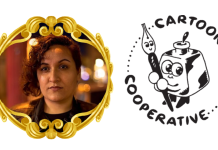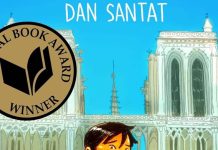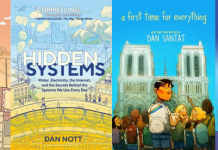
This year changed that. I was staying at the AYH hostel downtown, and had met a fellow librarian, who was energetic and overjoyed to be attending her first conference! On Sunday, I was returning from a dinner with my cousin and her slightly geeky family, and happened to encounter the librarian once again! She had volunteered to help with the setup for the banquet, and was heading back to the hotel to wait in line for the “bleacher” seats which would open after the banquet had concluded, but before the actual awards ceremony. (Who knew?!)
So we rushed to our seats, grabbed some complimentary posters featuring the covers of every Newbery and Caldecott Medal winner, got a drink from the bar, and waited for the ceremonies to start.
What I experienced that evening ranks as one of my greatest convention experiences ever, ALA or otherwise. (Which covers thirty years of being a fan and advocate, just so you know the scope of my experience.)
I was at Chicago during the Mid-Winter Conference last February, so I knew the winners, and was stoked that so many graphic novels had been honored by librarians. Dan Santat, the winner of the Caldecott, had published a graphic novel a few years ago, so I had read some of his work.
I didn’t expect anything amazing that night in San Francisco. It’s awards speeches, and while they are heartfelt, I didn’t expect to be caught so off guard.
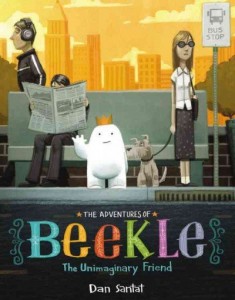
Five years ago I was offered a very lucrative job as a doodle artist at Google. It was the type of job where money no longer would have been a concern. My wife could have quit her job, lived closer to her family, and spent more time with our kids, who would have received a solid education in one of the country’s finest school districts. A few friends of mine who worked down the street at Yahoo! told me that they knew hordes of people who would kill to work at Google. This was an opportunity for me to stop all the self-doubting. This was a chance for me to decline with dignity: “Sorry, I’m not making books anymore because Google hired me to do their branding.”
But there was a pain in my side. What was wrong with me? Why didn’t I want this?
Perhaps a more responsible husband and father would have chosen this job for both career and financial security. The publishing industry, at the time, was going through a rough patch, and in 2010 Google was number four in Fortune magazine’s 100 Best Companies to Work For. Google told me that I could still publish books, but the work at the company would probably require most of my attention. I tossed and turned for weeks trying to decide what I wanted to do. I asked a few of my peers about what they would do.
“Uh, I’d take the job,” one would say. “So, wait, you’re telling me they’re hiring?” asked another.
I was hoping for them to tell me to “keep it real” and that making books was what I was meant to do. When Google asked for a response, I asked for an extra week to think things over. Then another. I even avoided their phone calls. Ultimately, I turned the job down because I knew that for the rest of my life I would have asked myself, “How good could I have been? How far could I have gone? How high could I have climbed?”
When forced to make a decision, I realized that the anxiety of not knowing my full potential greatly exceeded my anxiety over feeling inadequate. I wanted to know that I could shine just as brightly as all the other stars. I had to work harder.
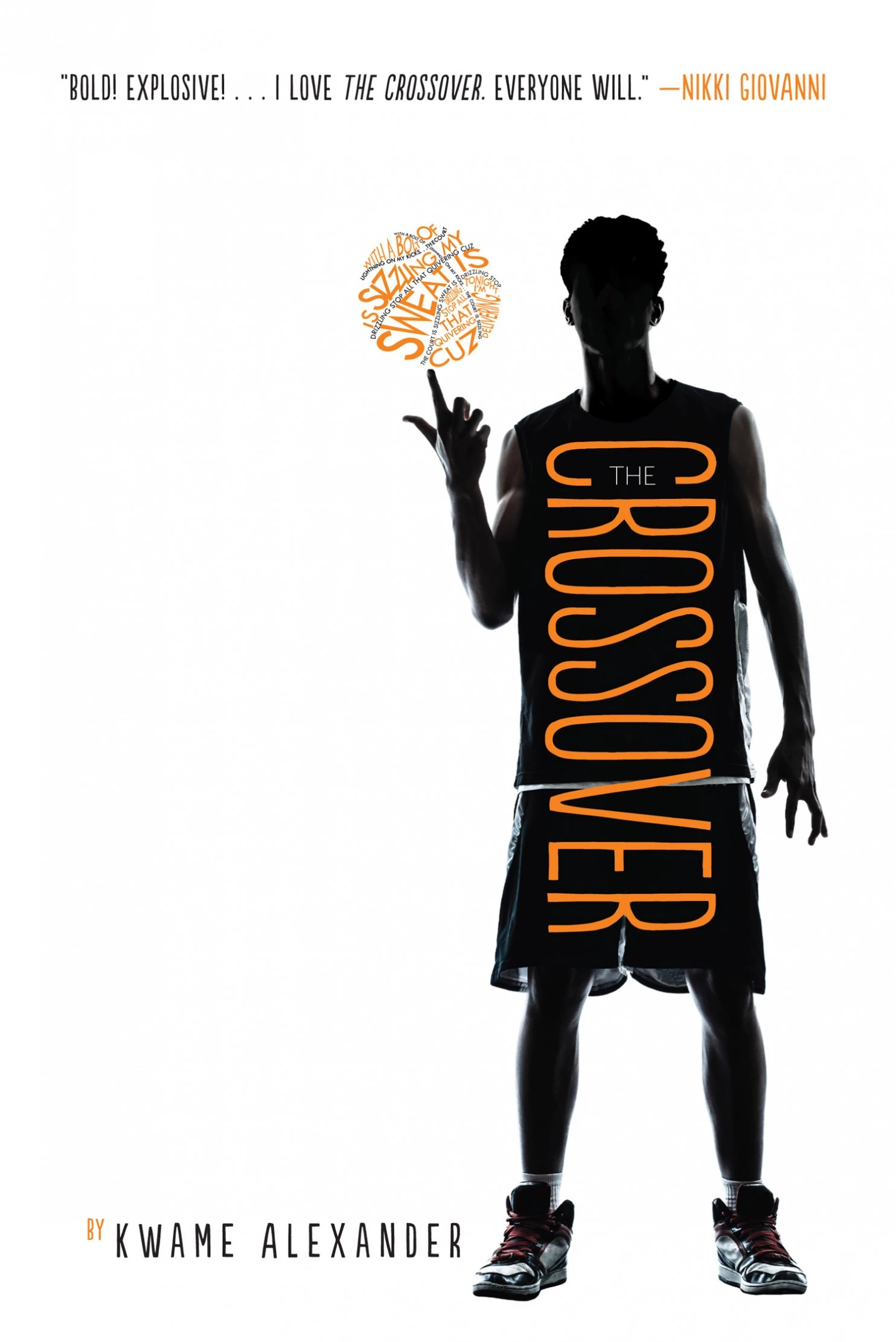
But he did:
Finally, to Samayah, my darling six-and-a-half-year-old, who says that her favorite book is The Crossover, though I won’t let her finish it yet. Thank you for waking me up one morning and asking me the question that would inspire this speech: “How do you win the Newbery?”
First,
Use your words.1971. Age 3. New York City.
Get your first dose of poetry under a red maple in Prospect Park…And the Sun God Said: That’s Hip…Ernest Gregg. Some of the Days of Everett Anderson…Lucille Clifton. Fox in Socks…Dr. Seuss…Listen and watch your mother make all these words dance off the page and into your imagination. When your sister Sia comes into the world, introduce her to poetry. Model read-alouds for her like you’re the parent enrolled in Early Childhood Education at Teacher’s College. Take her Uptown, so she can meet Stevie. John Steptoe. Learn Words. Love Words. Become so immersed in words that one day, at Riverside Day Care, when you’ve finished building your magical castle of blocks that house the ideas galloping through your mind, and your classmates knock them down because playtime is over, protest, defend yourself with the only weapons you’ve been given: words. Hey, man, that’s not hip. Those were my blocks that you flipped. Lest you want a quick payback, come and fix my quick-block stack. When your mother comes to pick you up that day, listen to the teacher tell her, “Your son intimidates the other children with the things he says. He is a little arrogant.” Watch your mother answer with a smile, “Yes, he is. We teach him to use his words, thank you.”
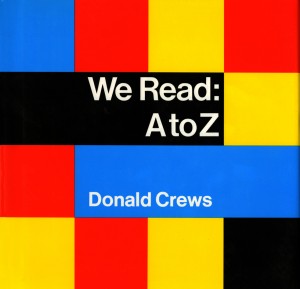
In due course, I met the editor Elizabeth Shub at Harper & Row. She asked if I had ever considered doing a picture book. I said that I had done one, but not for publication (not a really proactive response). Libby insisted on seeing it, and she passed it on to Ursula Nordstrom. We Read: A to Z was published by Harper in 1967. I was elated but not yet convinced that children’s books should be my main focus, so Ann and I continued as freelance designers. But I was curious enough about my ability to create something else for children—this time intending it for publication from the start. I designed and illustrated Ten Black Dots, an introduction to basic numbers. Libby had moved to Scribners by then, and it was published there in 1968.
Fork in the Road
As a design organization, Ann and I were, at best, not first call. We had a good reputation for creativity and reliability, but we never got major assignments. A good friend, John Condon, had some advice for me. He explained that, as we both knew, freelance work was ephemeral and that styles changed. He said, “Find something that only you can do, and be the only one who can supply it.” What came to my mind was my books.
Fork in the Road
I took his advice and began to think about another picture book. The result was Freight Train. I submitted it to Greenwillow Books, where both Libby and Ava now were, and they and Susan Hirschman responded to the dummy with the kind of enthusiasm that keeps creative juices flowing. Susan wanted to buy Freight Train before she had seen the entire dummy, but I told her she couldn’t have it until she had looked at all of it.
The transcripts are available, but I waited a month to post this with the video, because, well, the printed words miss the passion and emotion of the actual speeches.
Newbery Medal transcript (PDF)
I don’t know who will win next year, or in the future. But I do know I will be in the audience that evening, hoping to experience something just as amazing and remarkable.


